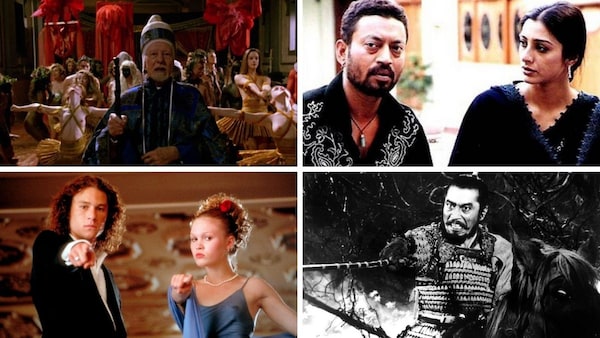Revisiting Shakespeare’s on-screen adaptations, from Throne of Blood to 10 Things I Hate About You
The iconic Globe Theatre closed for operations from today, about 400 years ago. But Shakespeare’s plays have lived on. Here’s taking a look at some of the adaptations of The Bard’s plays to screen.

Last Updated: 06.21 PM, Sep 06, 2021
On September 6 in 1642, English Long Parliament had ordered all theatres in London to be shuttered for good owing to growing internal discord during the First English Civil War. Globe Theatre, perhaps the most established of the lot, was closed too. The theatre, found by William Shakespeare’s company Lord Chamberlain's Men between 1597 and 99, was the seat of London’s burgeoning art and culture, or what the puritans termed as a place for “lascivious Mirth and Levity”. The open-air theatre was demolished shortly after, in 1644. Thankfully, the plays have been studied, analysed, reinterpreted and rejigged by scholars, experts and filmmakers for centuries, familiarising their milieu with the Bards’ works — from Roman Polanski, Laurence Olivier, Akira Kurosawa to Vishal Bhardwaj closer home. Whereas some of these directors have remained faithful to the original plays, others have woven contemporariness into their narratives, while preserving the essence of the source text.
For instance, Kurosawa’s Throne of Blood (1957) an adaptation of Macbeth, was set during the middle ages (1185-1600) of Japan, at a time when the court’s authority was first being challenged by samurai warriors. The film was heavily endowed with characteristics of Noh theatre, a form of art patronised by samurai warriors. Thus, Kurosawa reimagining the literary text as a Noh-inspired film was only fitting as an aesthetic. Kurosawa fused the theme of regicide with elements of Noh — hyper-stylised performances, mime, elaborate costumes, thread-bare sets and a staid pace — with a deft hand. There’s a calculated inertness about the film, but Throne of Blood is almost a direct translation of Macbeth, except for a few changes, such as Lady Macbeth’s pregnancy and miscarriage.
In contrast, Vishal Bharadwaj deviates significantly from the source text in Maqbool, by transporting a story set in 11th century Scotland to the heartlands of India. In Bharadwaj’s film, Duncan/Abbaji (Pankaj Kapur) is a local goon and Lady Macbeth/ Nimmi (Tabu) is his mistress. The three weird sisters are not witches, but two corrupt policemen. By setting Maqbool within the murky world of organised crime in Mumbai, Bharadwaj blurred the lines of morality and code of conduct, and the antihero’s dilemma, even more ambiguous. The world that Bharadwaj created was an indigenous pocket, where even the most heinous of crimes were legitimised, the most powerful, rewarded. But the regicide here isn’t propelled as much by the thirst for authority as it was a crime of passion. Maqbool (Irrfan Khan) is rid with guilt and ambition, but his ambition has more to do with demarginalisation than his greed for the Abbaji’s seat.
Julie Taymor’s The Tempest (2010), on the other hand, foregrounds gender politics in its version. Thus, Prospero was changed to Prospera (Helen Mirren), a woman cast out of her own kingdom after being accused of being a witch. Mirren’s casting as Prospera also underscored that the film would also explore motherhood as a dominant theme. She declares “others of my sex have burned for far less,” spotlighting female comradeship, previously unheard of in Shakespeare’s plays.
There are several other adaptations that, while being inspired by the plays, assume an identity of their own. Arguably one of the most misogynistic plays of The Bard, The Taming of the Shrew, is turned on its head where the titular shrew is a learned woman with control and agency in 10 Things I Hate About You (1999). Similarly, Heath Ledger's Patrick Verona is not the quintessential aristocrat who wants to marry for land. Like Julia Stiles’ Katherine "Kat" Stratford, he is also a social pariah, resisting a manufactured order. When Kat and Patrick interact, they bond over a shared sense of ostracisation. The ostensible “taming”, where Patrick takes payment from a classmate to date Kat, becomes an acrid commentary on gendered suppression.
Shakespeare is considered to be one of the most prolific and celebrated playwrights to have walked the planet. This is why, his plays are still mined by filmmakers to create art, be it Sanjay Leela Bhansali’s take on Romeo and Juliet in Goliyon Ki Rasleela Ram-Leela (2013) or Robert Wise and Jerome Robbins’s West Side Story (1961), or the beloved The Lion King (based on Macbeth). With directors becoming increasingly adventurous in their narratives, Shakespeare’s plays seem to be getting a fresh lease of life.

 Premium
Premium